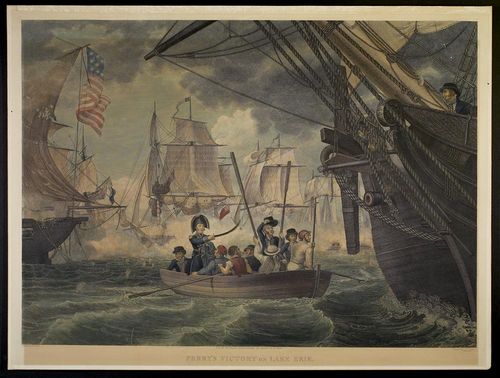Annotation:Perry's Victory (1): Difference between revisions
No edit summary |
No edit summary |
||
| Line 2: | Line 2: | ||
---- | ---- | ||
<p><font face="garamond, serif" size="4"> | <p><font face="garamond, serif" size="4"> | ||
'''PERRY'S VICTORY [1]'''. AKA and see [[Butler County]]." American, Jig or March (6/8 time). USA, southwestern Pa. G Major. Standard tuning (fiddle). AB or AABB. Samuel Bayard (1981) was of the opinion that “Perry’s Victory” was at least as old as the 18th century, and has a "tantalizing" general resemblance to an Irish song tune called [[A Ghaoith o'n Deas]] (O Southern Breeze), with an especially close resemblance in the second strain. Also generally similar are the melodies [[Men of Garvagh (The)]] and [[Black Dance (The)]]. | '''PERRY'S VICTORY [1]'''. AKA and see [[Butler County]]." American, Jig or March (6/8 time). USA, southwestern Pa. G Major. Standard tuning (fiddle). AB or AABB. Samuel Bayard (1981) was of the opinion that “Perry’s Victory” was at least as old as the 18th century, "of uncertain date and ancestry," bu that it has a "tantalizing" general resemblance to an Irish song tune called [[A Ghaoith o'n Deas]] (O Southern Breeze), with an especially close resemblance in the second strain. Also generally similar are the melodies [[Men of Garvagh (The)]] and [[Black Dance (The)]]. | ||
[[File:Perry'svictory.JPG|500px|thumb|right|]] | [[File:Perry'svictory.JPG|500px|thumb|right|]] | ||
The title references the victory on September 10, 1813, when Commodore Oliver Hazard Perry defeated and captured a British squadron of warships at the Battle of Lake Erie. The battle, fought during the War of 1812, secured control of Lake Erie for the United States and enabled General William Henry Harrison to conduct a successful invasion of Western Upper Canada. Harrison subsequently defeated the British and Indians at the Thames River on October 5, 1813. The dual victories of Lake Erie and the Thames provided an important morale boost to the young country and gave the United States a much stronger bargaining position at the peace talks. The Treaty of Ghent, signed on Christmas Eve 1814, ended the War 1812. | The title references the victory on September 10, 1813, when Commodore Oliver Hazard Perry defeated and captured a British squadron of warships at the Battle of Lake Erie. The battle, fought during the War of 1812, secured control of Lake Erie for the United States and enabled General William Henry Harrison to conduct a successful invasion of Western Upper Canada. Harrison subsequently defeated the British and Indians at the Thames River on October 5, 1813. The dual victories of Lake Erie and the Thames provided an important morale boost to the young country and gave the United States a much stronger bargaining position at the peace talks. The Treaty of Ghent, signed on Christmas Eve 1814, ended the War 1812. | ||
Revision as of 00:01, 26 October 2015
Back to Perry's Victory (1)
PERRY'S VICTORY [1]. AKA and see Butler County." American, Jig or March (6/8 time). USA, southwestern Pa. G Major. Standard tuning (fiddle). AB or AABB. Samuel Bayard (1981) was of the opinion that “Perry’s Victory” was at least as old as the 18th century, "of uncertain date and ancestry," bu that it has a "tantalizing" general resemblance to an Irish song tune called A Ghaoith o'n Deas (O Southern Breeze), with an especially close resemblance in the second strain. Also generally similar are the melodies Men of Garvagh (The) and Black Dance (The).

The title references the victory on September 10, 1813, when Commodore Oliver Hazard Perry defeated and captured a British squadron of warships at the Battle of Lake Erie. The battle, fought during the War of 1812, secured control of Lake Erie for the United States and enabled General William Henry Harrison to conduct a successful invasion of Western Upper Canada. Harrison subsequently defeated the British and Indians at the Thames River on October 5, 1813. The dual victories of Lake Erie and the Thames provided an important morale boost to the young country and gave the United States a much stronger bargaining position at the peace talks. The Treaty of Ghent, signed on Christmas Eve 1814, ended the War 1812.
Sources for notated versions: he Pittsburg Pioneers (martial) Band via Hiram Horner (fifer from Westmoreland and Fayette Counties, Pa., 1960), the Hoge MS. (a Pennsylvania fife MS.), Mary Ann Rogers (fiddler from Greene County, Pa., 1930's) [Bayard].
Printed sources: Bayard (Dance to the Fiddle), 1981; No. 565A‑C, pp. 501‑502.
Recorded sources:
Back to Perry's Victory (1)
